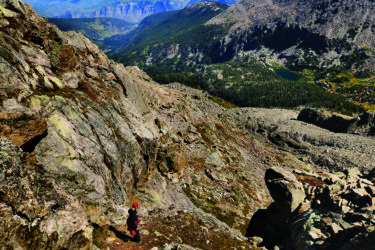The Local newsletter is your free, daily guide to life in Colorado. For locals, by locals.
When the nation’s hospitality industry began reopening its doors in late May, Centennial Staters hit the road. But many chose to stay close to home, which has been good news for Colorado businesses that rely on income from tourism.
Statistics suggesting we were happy to exchange exotic locales for nearby adventures abound. Visitation at Colorado’s 42 state parks increased by an average of 30 percent this summer, and 391,018 resident fishing licenses were issued in 2020, up 102,213 from 2019, according to the Colorado Tourism Office (CTO). From June 1 to September 7, colorado.com—the CTO’s official marketing website—also experienced 18 percent more traffic from in-state visitors compared to the same period in 2019, indicating that more locals were planning trips within state lines.

Apparently some of those in-state visitors have been eyeballing Fort Collins. While past research has indicated that Coloradans make up a large share of visitors to Fort Collins, Visit Fort Collins director of marketing Katie Schneider says 2020 was an especially strong year for staycationers. “We definitely saw more of that [in-state travel] than normal this summer and fall, Schneider says. “People just coming up from the Denver metro area and other neighboring communities who are familiar with who we are and what we have to offer. And that has been a positive for sure.” Despite the significant loss in revenue endured by the local lodging and hospitality industry due to the COVID-19 pandemic, Schneider says there has been an uptick in what industry insiders call the short booking window—meaning more visitors are making travel plans for upcoming weekends rather than months or seasons in advance. This shift in traveler behavior has led Visit Fort Collins to focus on promoting “microtrips” or weekend getaways for those who live less than two hours away. The organization also hopes to attract remote workers, individuals who can now work from anywhere and see a new place in their off hours.

The Broadmoor, a luxury resort in Colorado Springs, has also seen a rise in bookings by Colorado residents. This is a big change for the iconic property, which is primarily a meetings and corporate groups destination. The drop in business travel, large group meetings, and events in 2020 has been difficult for the hotel, says Barry Brown, the Broadmoor’s director of sales and marketing. “Our leisure travelers have become our top market in 2020, which was a big shift in our ‘normal’ operations,” Brown says. “As people shifted their travel plans from far-flung to closer-to-home, the Broadmoor was a logical choice for Colorado residents, particularly from the Front Range. Many people wanted to splurge and feel pampered since they weren’t traveling anywhere else, so they looked to us for a nearby elevated experience to replace trips like canceled honeymoons abroad.”
The pandemic and the new age of social distancing drove the resort—which spans 5,000 acres and includes a trio of Wilderness Properties—to alter its messaging to focus on its wealth of “space to spread out” and indoor and outdoor activities available on-site. For those who aren’t comfortable staying inside a hotel, the Broadmoor is also promoting its private cabins, brownstones, and cottages. “We heard from many of our Colorado guests,” Brown says, “that we made them feel they had traveled farther than a few miles and left feeling the restorative effects of travel, even just with a staycation.”
But is an increase in staycation visitors enough to make up for the loss of revenue Colorado lodging properties have experienced since the onset of the pandemic? Unfortunately, for some properties like River Ridge Rentals in Breckenridge, the answer is no. From June 1 to August 31, the company, which manages 42 vacation rentals, had 26 percent more reservations from within Colorado compared to the previous year. However, the strong summer won’t make up for what was lost when the company had to close from mid-March until the end of May. “[The summer] was slightly better than previous years,” says Blue Ridge CEO Ashley Kubiszyn, “but we’d also come off losing over a million dollars [by missing the end of the ski season]. We won’t make up that ground anytime soon.”
River Ridge Rental woes aren’t surprising, given the fact that from March 8 to November 7, total Colorado traveler spending was $7.4 billion, compared with $15.4 billion in 2019. Fortunately, there are ways Coloradans can help the myriad of tourism industry businesses affected, which range from hotels and recreational outfitters to restaurants, bars, and retail outlets. Fort Collins’ Schneider says it is possible to enjoy the mental and physical benefits of traveling in the state and support the industry—all while being safe. “All of our restaurants, hotels, and retail establishments are going above and beyond in their cleaning protocols. It’s a visitor’s responsibility as well to come prepared and travel safely, and that means adhering to all of the guidelines,” she says. “Wear a mask and social distance. We know it requires a lot of patience and a lot of kindness, but those are some pretty small things we can do to make sure our businesses and our communities are thriving going into 2021.”
In addition to masking up and practicing social distancing, CTO communications manager Abby Leeper encourages travelers and residents to activate Colorado coronavirus exposure notifications (opt in here) and stick to the “know before you go” rule by researching the destination and its specific restrictions with regard to dining, retail, and recreational offerings in advance. “This way, each guest will know what to expect when they arrive at their destinations—and what’s expected of them—to keep themselves and others safe,” Leeper says.
If you aren’t comfortable traveling just yet, consider supporting businesses in your favorite local travel destinations by shopping for goods online. Many destinations, including Fort Collins, which recently opened an online marketplace, have launched shop local campaigns. (See them all on this shareable map presented by the Colorado Small Business Development Center and the Colorado Office of Economic Development and International Trade.) “We recognize that there are so many people who have a tie to Fort Collins,” Schneider says, “but if they can’t come here right now, we will bring Fort Collins to them.”








